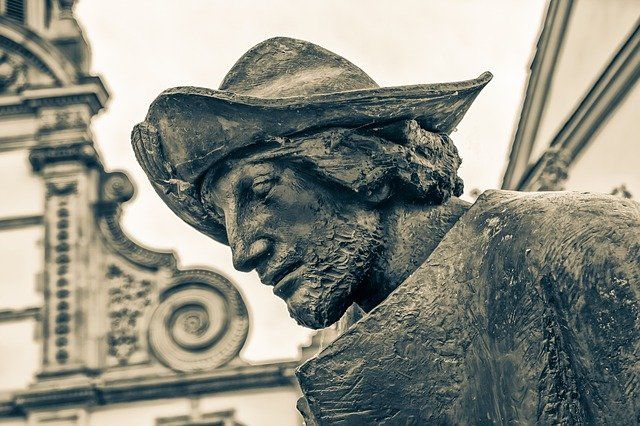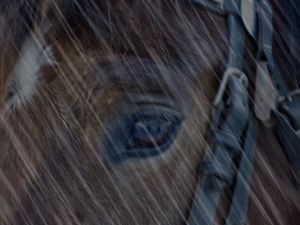The sky was dark and threatening as John Bunyan mounted his horse that August morning in 1688. It had been an errand of compassion that had brought him to Reading — a long detour in his journey from Bedford to London. But now, grateful to God that he had managed to effect the reconciliation between a father and son that he had hoped to accomplish there, he set off for London.
Despite the gathering storm he was anxious to keep his engagement to preach in Whitechapel and not disappoint the congregation that had so long anticipated his visit. Recently recovered from a debilitating illness, Bunyan rode at a steady pace. But the skies grew blacker still and it was not long before a violent storm broke upon him. Both horse and rider were soon drenched in the torrential rain, while the roads, never much better than rubble-filled ditches, quickly turned to mud tracks. But no alternative remained for Bunyan other than to struggle onwards towards London.
Celestial city
Soaked through and exhausted, Bunyan at last reached the home of John Strudwick in Holborn where he expected to stay. With kindness and concern his friends welcomed him and did their best to care for the well-loved preacher, who was now evidently feverish and suffering from his exposure to the elements. After a day or two of rest, however, John Bunyan — renowned author of The Pilgrim’s Progress — appeared his genial self once more and was eager to preach as he had promised, despite earnest appeals from his friends against taking such a risk.

This initial recovery, however, had hidden the seriousness of Bunyan’s condition and not long after he had preached, the full effects of that ride became apparent. His health deteriorated rapidly and soon pneumonia set in. Those who watched over him could see that John Bunyan’s own pilgrimage was swiftly drawing to a close. A mere ten days later, and before his wife Elizabeth could be summoned, the ‘Immortal Dreamer’ had crossed the bridgeless River into the Celestial City.
I go to the Father
The ‘Last Enemy’ had sprung unawares on John Bunyan at the comparatively early age of sixty but the enemy gained no advantage by his sudden attack. Here was one of Christ’s faithful servants, well prepared against his assaults. ‘Weep not for me but for yourselves,’ he whispered as the end drew near and he could see the obvious distress of those who watched around him. Like many other Christians as they face death, Bunyan’s thoughts were clearly turning to that solid foundation of his faith laid in the atoning sacrifice of his Saviour. ‘I go to the Father of our Lord Jesus Christ, who will, no doubt through the mediation of his blessed Son, receive me, though a sinner; where I hope we ere long shall meet and sing the new song and remain everlastingly happy, world without end.’ These words, spoken with much difficulty but in confidence and hope, were his last.
Sometimes when we read accounts like this we are troubled about how we ourselves will cope with death. We fear lest by weakness or lack of faith we may fail the Lord at the last. Is there any way in which to prepare ourselves while strength and health are still ours? It would seem from his writings that Bunyan himself had learnt lessons long years before that August day in 1688, lessons which came to his aid in his time of need.

Sentence of death
Bunyan’s life spanned tempestuous years for the church of Jesus Christ. Born in 1628, three years after Charles I had ascended the throne, and dying the year of the ‘Glorious Revolution’ when religious toleration was granted at last, he faced many years of suffering for Christ’s sake. Apart from the period of Cromwell’s Protectorate, crippling fines, confiscation of goods, banishment, imprisonment and even death were the order of the day for many faithful Christians who would not compromise their spiritual principles.
Bunyan himself had spent the twelve best years of his manhood in Bedford county jail. He writes: ‘I was made to see that if ever I would suffer rightly, I must first pass a sentence of death upon everything that can properly be called a thing of this life, even to reckon myself, my wife, my children, my health, my enjoyment and all, as dead to me and myself as dead to them’. Legitimate pleasures of life these were, and Bunyan like everyone else rejoiced in them, yet he had learnt to hold them with a light grasp.
In November 1660 when he faced his first imprisonment he was indeed called to ‘pass a sentence of death’ upon his dearest joys; Mary, his blind daughter and eldest of his four children, was only ten at the time. Writing of these circumstances Bunyan says, ‘The parting with my wife and poor children hath oft been to me as the pulling of my flesh from my bones … the hardships and miseries that my poor family was like to meet with … Especially my poor blind child who lay nearest my heart than all I had besides … would break my heart in pieces. I was as a man pulling down his house upon the head of his wife and children; yet thought I, I must do it, I must do it’. Love for Christ and faithfulness to his truth had made it a necessity.
Crossing the river
Bunyan had long learnt to look upon the King of Terrors with a steady eye. In his great allegory, The Pilgrim’s Progress, he accompanied each of his pilgrims one by one to the brink of the River of Death. Mr Valiant-for-Truth passed courageously through the dark waters calling out, ‘Death, where is thy sting? Grave, where is thy victory?’ and Bunyan heard all the trumpets sounding for him on the other side.

The waters were deep indeed and overflowed their banks as old Mr Honest crossed over, but Good Conscience lent him a hand and so crying out, ‘Grace reigns!’ he too arrived safely on firm ground. Mr Ready-to-Halt threw away his crutches and entered the river exclaiming, ‘Welcome life,’ while Mr Despondency, in spite of many fears, entered the cold waters saying, ‘Farewell night, welcome day!’ His daughter, who shared his fearful spirit, was heard singing as she passed through, though none could catch the words of her song.
Mr Standfast, that noble and prayerful pilgrim, found the river unusually calm when he crossed over; but not all of Bunyan’s pilgrims had so easy a passage. Christian himself struggled as he entered the river and in his dream Bunyan heard him call out to his companion Hopeful, ‘I sink in deep waters; the billows go over my head’. The sins of his past life rose up to distress him and rob him of any confidence that he would ever gain the farther shore.
But Hopeful was near at hand to hold him up and point him away from his failures to the mercy of God. Perhaps words spoken by one of the Shining Ones before he entered the River came back to his mind: ‘You shall find it [the River] deeper or shallower as you trust in the King of the Place’; for as Christian was grappling with the turbulent waves he suddenly cried out, ‘Oh, I see him again! And he tells me, “When thou passest through the waters, I will be with thee, and through the rivers, they shall not overflow thee”’.
The glories of heaven
So it was that, through the experiences of his pilgrims, Bunyan had thought often about death, and in this way prepared himself for the time when he too would reach the end of the journey. But the glories of heaven were also frequently in his mind. Life was insecure for the followers of Christ, and the certainty of the joys awaiting Christ’s believing people encouraged and gladdened his heart.
During his first period of imprisonment Bunyan wrote a treatise called The Holy City. Lifting his eyes from the sordid surroundings of his cheerless prison, he roamed in imagination along the streets and through the palaces of the New Jerusalem. Little wonder that he longed to be there! In his work The Desire of the Righteous Granted we can almost catch the passion of his heart as he writes, ‘To see Christ then, to see him as he is in glory is a sight worth going from relations and out of the body and through the jaws of death to see … to see him preparing mansion houses for those his poor ones that are now by his enemies kicked to and fro like footballs in the world; and is not this a blessed sight?’
Perhaps the finest description of heaven outside the pages of Scripture comes from Bunyan’s pen and is found at the end of The Pilgrim’s Progress. It needs to be read in full to gain any true appreciation of the magnitude and glory of the Celestial City, as it appeared to the eyes of John Bunyan as he looked in through the gates after his pilgrims.
And so as he lay dying, far from his wife Elizabeth and from his home, we are not surprised that he could exclaim, ‘O! who is able to conceive the inexpressible, inconceivable joys that are there? None but those who have tasted of them’.





